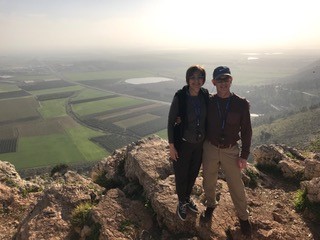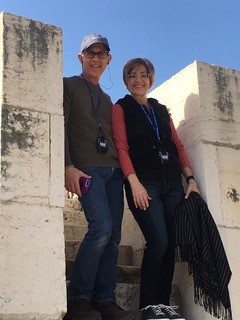This article is written by GCI pastor Mark Mounts.
My wife, Debra, and I recently had the opportunity to visit the “Holy Land” with a group of GCI church leaders. It was a life-changing journey we will never forget. The geography and the sites we visited gave us a new perspective into the ministry of Jesus Christ. We were particularly moved by the place where Jesus shared the Beatitudes with his disciples. (For a bit more on the geography, see my accompanying short feature: “Magdala and Capernaum.”

 For the record, the speculation I will make in the remainder of this article is based on ideas expressed by our guide, and what I have personally considered since returning from the trip. So, for the sake of this article, please “play along.”
For the record, the speculation I will make in the remainder of this article is based on ideas expressed by our guide, and what I have personally considered since returning from the trip. So, for the sake of this article, please “play along.”
Jesus arrived during a time when Jewish residents in the Galilean area were expecting something big. In spite of the Roman rule, they had jobs, they were involved in trade and production of food and usable goods, but they expected more. They were expecting a leader—a Messiah—to rise up and start a political and religious movement that would eventually overthrow the Romans. Jesus had already performed a number of miracles, and many who were aware of his “great wonders” were asking, “Is this him?” “Is he the one?”
Jesus knew their expectations and they wanted immediate, as well as long-term intervention. The problem is, the intervention that Jesus was about to offer was not going to fulfill their expectations in any way.
I suggest a main purpose of the Beatitudes was because Jesus was preparing the disciples for what they would face three years later and during their ministry. So, let’s start there, in the Garden of Gethsemane.
Just a few hours before he is to die, Jesus took Peter, James and John with him to Gethsemane to pray. There he pleaded three times with his Father that if there was another way, let it be seen. In spite of this overwhelmingly emotional experience that caused Jesus to sweat blood, he accepted his Father’s will.
Jesus knew what he was about to face. He also knew what his disciples would face—that Peter would want to fight in hopes of possibly starting the war that will overthrow the Romans. (Peter tried that very night and Jesus rebuked him for this attempt.) He knew that before the day was through, almost all the disciples would abandon him in fear. He knew he was about to be tortured, rushed to the cross, and quickly buried—and he knew the disciples would have no idea regarding what just happened or why.
That is part of what Jesus was telling them when he gave the Beatitudes three years earlier. He told them he knew there would be “trouble in their hearts” and they would “mourn”—but something miraculous was going to happen and they would be comforted. He told them they would become meek, but not weak. He told them this change would be so miraculous that it would be all they want, and they would begin to understand that it was the only thing that really mattered in life. They would become people of mercy, not judgment, because they would know and accept what it felt like to have none of their expectations met in the way they wanted them. He assured them they would be messengers of peace in spite of the persecution they would face. He told them they will be treated the same way he was treated, and indeed they eventually were.
This is not what the crowd wanted to hear. They wanted a physical, religious and political savior—one who would lead them to victory over the Romans—now. His words didn’t make a lot of sense until after his death, resurrection and ascension. When the Holy Spirit—the comfort he promised—arrived, things became to be made clear.
I believe the whole point of the Beatitudes is summed up in a statement Jesus made later in Matthew:
“Come to me, all of you who are weary and burdened, and I will give you rest. Take my yoke upon you and learn from me, for I am gentle and humble in heart, and you will find rest for your souls. For my yoke is easy and my burden is light” (Matt. 11: 28-30).
When we read the Beatitudes, are we looking to Jesus? Is there something troubling our hearts? Are we mourning? Do we think we have this “meek” thing down, only to realize that pride is still burning in our hearts? Do we become resentful and afraid because what we are hoping for—maybe even expecting—is not happening? Guess what, someone knows exactly how we feel; Jesus felt that way too. The difference is, of course, he fought the fight for us and won. Because of his victory, we can find a bit of hope in the middle of our fear, confusion, doubt and sorrow. We shouldn’t be surprised when we find ourselves “poor in spirit,” or mourning. Jesus told us he knows there are times we will feel all is lost and no one understands.
He told his disciples—and us—what we will experience in the “Beatitudes” (Matt. 5: 2-14), and then he told them and us where to go to find comfort and rest—where we find salvation (Matt. 11: 28-30). Yes, Jesus knows exactly what we are going through. As the Son of God, he also accepted the realities of experiencing the Beatitudes. The difference, of course, is that he knew the Comforter and he knew the Comforter would come to us. He knew the Comforter would give us new life—we would be born again. We are now in Christ, and he is in us.
Jesus was preparing his disciples and us to understand that in this life we will suffer and hurt just as he did, but he offers us love, comfort and rest—in him, we inherit the kingdom of heaven. The Beatitudes tell us Jesus really does get it.



Thanks much Mark for making your experience so vivid and real.
The Beatitudes, Christian author Dallas Willard suggests in his award winning book The Divine Conspiracy, are not intended to instruct us on the qualities Christians should have in their lives. Rather, they show that Jesus saw that all can be called to repentance and realize the blessings of the Kingdom of God. A wide spread popular notion proposes that it is the humble, the righteous, the merciful, the pure in heart, etc., that “enter the Kingdom of Heaven”. This explanation, so Willard, is flawed and/or questionable because it is in essence salvation by works, or maybe salvation by attitude. Willard proposes that it is a mistake to think that the Beatitudes are instructions on how to be blessed. They are not telling us what we should do or what we should be. They are not conditions for pleasing God. They are rather telling us WHO can enter the Kingdom of the Heaven. Christ calls the unintelligent, the common man, the foolish, the weak and the despised to “enter the Kingdom of God”.
What a blessing!